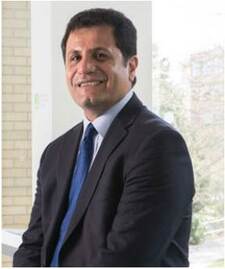Fifth UK Mobile, Wearable and Ubiquitous Systems Research Symposium
3rd-4th July 2023, Lancaster University
Introduction

Mobile, wearable and ubiquitous systems have a pivotal role in today’s society and daily life. Research and innovation in these domains has the potential to unlock important new applications and open the door to a better understanding of their use.
Building on the success of the previous symposiums, the venue this year supports discussion and presentation of research within the UK mobile, wearable and ubiquitous systems community.
We solicit the submission of one page presentation abstracts. The work described can range from mature published recent ideas to more preliminary contributions on the following general topics:
Submissions of one page presentation abstracts will be reviewed and selected for oral presentation based on scope as indicated above. Preference for presentation will be given to early career researchers in case of over-submission. All presented submissions will be published on the programme website (MobiUK.org).
Further details on how to submit can be found below.
Title: eXtended Reality and Passengers of the Future
Abstract: I will present our work into improving passenger journeys using immersive Virtual and Augmented Reality (together XR) to support entertainment, work and collaboration on the move. In Europe, people travel an average of 12,000km per year on private and public transport, in cars, buses, planes and trains. These journeys are often repetitive and wasted time. This total will rise with the arrival of fully autonomous cars, which free drivers to become passengers. The potential to recover this lost time is impeded by 3 significant challenges:
XR headsets could allow passengers to use their travel time in new, productive ways, but only if these fundamental challenges can be overcome. Passengers would be able to use large virtual displays for productivity; escape the physical confines of the vehicle and become immersed in virtual experiences; and communicate with distant others through new embodied forms of communication. I will discuss our solutions to these challenges, focusing on the visual aspects. We are: developing new interaction techniques for VR and AR that can work in confined, seated spaces; supporting safe, socially acceptable use of XR providing awareness of others and the travel environment; and overcoming motion sickness using multimodal countermeasures to support these novel immersive experiences.
 Bio: Stephen Brewster is a Professor of Human-Computer Interaction in the School of Computing Science at the University of Glasgow. He got his PhD in auditory interface design at the University of York. At Glasgow, he leads the Multimodal Interaction Group, which is very active and has a strong international reputation in HCI (http://mig.dcs.gla.ac.uk). His research focuses on multimodal HCI, or using multiple sensory modalities and control mechanisms (particularly audio, haptics and gesture) to create a rich, natural interaction between human and computer. His work has a strong experimental focus, applying perceptual research to practical situations. A long-term focus has been on mobile interaction and how we can design better user interfaces for users who are on the move. Other areas of interest include VR/AR, wearable devices and in-car interaction. He pioneered the study of non-speech audio and haptic interaction for mobile devices with work starting in the 1990's. He was a General Chair of CHI 2019 in Glasgow, CHI papers chair in 2013 and 2014, and has previously chaired MobileHCI, EuroHaptics and TEI. He is a member of the ACM SIGCHI Academy, an ACM Distinguished Speaker and a Fellow of the Royal Society of Edinburgh.
Bio: Stephen Brewster is a Professor of Human-Computer Interaction in the School of Computing Science at the University of Glasgow. He got his PhD in auditory interface design at the University of York. At Glasgow, he leads the Multimodal Interaction Group, which is very active and has a strong international reputation in HCI (http://mig.dcs.gla.ac.uk). His research focuses on multimodal HCI, or using multiple sensory modalities and control mechanisms (particularly audio, haptics and gesture) to create a rich, natural interaction between human and computer. His work has a strong experimental focus, applying perceptual research to practical situations. A long-term focus has been on mobile interaction and how we can design better user interfaces for users who are on the move. Other areas of interest include VR/AR, wearable devices and in-car interaction. He pioneered the study of non-speech audio and haptic interaction for mobile devices with work starting in the 1990's. He was a General Chair of CHI 2019 in Glasgow, CHI papers chair in 2013 and 2014, and has previously chaired MobileHCI, EuroHaptics and TEI. He is a member of the ACM SIGCHI Academy, an ACM Distinguished Speaker and a Fellow of the Royal Society of Edinburgh.
Title: Patents, what are they and why are they important to companies
Abstract: A patent is a form of intellectual property, which grants to the owner an exclusive right to prevent others from using that product or process as defined by the claims. Patents are important to companies because they can be a great source of revenue but they can also potentially disrupt your business if patents are asserted against you. Litigation in the pharmaceutical and telecommunications space resulting in potential damages in excess of $1B, illustrates the need for companies to maximise their own R&D capabilities to realise patent portfolio’s.
 Bio: John Samuels is currently the head of the Device & Services Unit in Nokia Technologies CTO organisation. The teams he manages are responsible for protecting implementation patents relevant to end user devices and supporting Nokia’s licensing and litigation teams with regards third party usage of those patents. John has worked for Nokia for over 30 years where he has witnessed first hand the rapid growth and adoption of mobile telecommunications; initially working in R&D for 10 years designing RF circuitry for mobile handsets before a career change lead him to Nokia’s intellectual property department. He has held various positions within that department, including team leadership roles for almost 20 years, all roles involving close collaboration with Nokia’s R&D teams and in support of some of Nokia’s key licensing and litigation projects over the last 15 years, assisting Nokia Technologies to reach a current annual licensing rate of 1.5B Euro’s. John has a BEng in Electronic and Electrical Engineering and a MSc in Radio Frequency & Microwave Engineering, both from Bradford University. He is a qualified European Patent Attorney. In his spare time he cycles and practices Taekwondo.
Bio: John Samuels is currently the head of the Device & Services Unit in Nokia Technologies CTO organisation. The teams he manages are responsible for protecting implementation patents relevant to end user devices and supporting Nokia’s licensing and litigation teams with regards third party usage of those patents. John has worked for Nokia for over 30 years where he has witnessed first hand the rapid growth and adoption of mobile telecommunications; initially working in R&D for 10 years designing RF circuitry for mobile handsets before a career change lead him to Nokia’s intellectual property department. He has held various positions within that department, including team leadership roles for almost 20 years, all roles involving close collaboration with Nokia’s R&D teams and in support of some of Nokia’s key licensing and litigation projects over the last 15 years, assisting Nokia Technologies to reach a current annual licensing rate of 1.5B Euro’s. John has a BEng in Electronic and Electrical Engineering and a MSc in Radio Frequency & Microwave Engineering, both from Bradford University. He is a qualified European Patent Attorney. In his spare time he cycles and practices Taekwondo.
Title: 6G Vision and Sensing in 6G
Abstract: The talk will present an overview of 5G roadmap and present a distinct vision for 6G that is expected to be available in market in 2030+. A number of important technologies will be presented that require new thinking and solutions such as; Reconfigurable Intelligent Surfaces, Internet of Senses, Integrated communication and sensing, THz imaging and positioning, high quality time synchronisation, AI/ML , Massive MIMO and important role of Satellite communications in 6G era. The talk will also present how combination of these technologies will enable teleportation which open up completely new type of applications and use cases.
 Bio: Rahim Tafazolli is the only Regius Professor of Electronic Engineering, a Professor of Mobile and Satellite Communications, the Director of Institute of Communication Systems (ICS) and Director and founder of 5G Innovation Centre (5GIC) and 6GIC at the University of Surrey. He has been active in research for over 30 years and published more than 1000 technical articles and editor of two books and Chief editor of Wiley’s 5G Ref. book. Regius Tafazolli has been a technical and strategic advisor to many mobile companies and recently served as a member of UK Government DCMS Task Force on “Diversification of Telecom equipment providers ecosystem” and now member of DCMS Council of advisors on Diversification He is expert representative of UKSA (UK Space Agency) to ESA (European Space Agency) on 5G over Satellite. In 2014, He was technical advisor to Mayor of London, Boris Johnson, on “London Infrastructure investment 2050 Plan”. He is a Fellow of Royal Academy of Engineering (FREng), Fellow of IET (FIET) and Fellow of WWRF (Wireless World Research Forum).
Bio: Rahim Tafazolli is the only Regius Professor of Electronic Engineering, a Professor of Mobile and Satellite Communications, the Director of Institute of Communication Systems (ICS) and Director and founder of 5G Innovation Centre (5GIC) and 6GIC at the University of Surrey. He has been active in research for over 30 years and published more than 1000 technical articles and editor of two books and Chief editor of Wiley’s 5G Ref. book. Regius Tafazolli has been a technical and strategic advisor to many mobile companies and recently served as a member of UK Government DCMS Task Force on “Diversification of Telecom equipment providers ecosystem” and now member of DCMS Council of advisors on Diversification He is expert representative of UKSA (UK Space Agency) to ESA (European Space Agency) on 5G over Satellite. In 2014, He was technical advisor to Mayor of London, Boris Johnson, on “London Infrastructure investment 2050 Plan”. He is a Fellow of Royal Academy of Engineering (FREng), Fellow of IET (FIET) and Fellow of WWRF (Wireless World Research Forum).
Title: Cryoegg: a mobile wireless sensor platform for exploring sub-ice environments
Abstract: Increasing temperatures are causing increased melt on the Earth’s glaciers and ice sheets, which must be tracked and quantified to understand how ice will respond to future climate change. Yet collecting and returning data from beneath kilometres of ice is challenging: cabled connections stretch and eventually break, access points are limited, and there are few power sources. We have developed a ‘Cryoegg’ to address these challenges – a low-power wireless sensor platform that can be deployed through a narrow borehole or opening, collect data and transmit through up to 3.5 km of ice. Cryoegg uses very high frequency radio (Wireless MBus) and is optimised to collect and return data for up to a decade. The egg is mobile, so can collect distributed measurements from subglacial drainage networks that will be used to understand flow beneath the Greenland ice sheet. This talk will report results from testing in various sub-ice locations, including the 3.5 km deep East Greenland Ice Core Project borehole, and outline plans for future development.
 Bio: Elizabeth completed her MSci in Physical Geography in 2005 and her PhD in Glaciology in 2008, both at the University of Bristol. She continued as a postdoctoral researcher in Aerospace Engineering and Glaciology until 2014. She was appointed a Lecturer at Cardiff University School of Earth and Environmental Sciences in 2014 and was subsequently promoted to Senior Lecturer and Reader. She returned to the University of Bristol as Associate Professor in Glaciology in 2023.
Bio: Elizabeth completed her MSci in Physical Geography in 2005 and her PhD in Glaciology in 2008, both at the University of Bristol. She continued as a postdoctoral researcher in Aerospace Engineering and Glaciology until 2014. She was appointed a Lecturer at Cardiff University School of Earth and Environmental Sciences in 2014 and was subsequently promoted to Senior Lecturer and Reader. She returned to the University of Bristol as Associate Professor in Glaciology in 2023.
Title: From the GUI to ChatGPT: a historical sketch of HCI research agendas and their applicability today
Abstract: Bill Gates has recently remarked that ChatGPT-4 is as revolutionary as the GUI was thirty years ago. Will it be? To assess that claim I want to trace the connection between the HCI research that lead to the GUI and the research that needs to be done with large language models and their chatbox interfaces today. I will explore how interactions with GUIs and LLMs have basic properties in common - various kinds of abstract notions about content (in the case of GUIs about the things represented graphically and in the case of LLMs, the thing being modelled); how these abstractions are also engineered into the systems themselves; and in their ‘aboutness’ to put it in Peirce-like terms, i.e., what they are for, being visible and known to both users and engineers alike. In the case of the Xerox GUI, this aboutness had to do with document editing; with LLMs it is, in my view, still evolving and unclear, even contested. These assumptions may be said to constitute the grammar of action with GUIs and LLMs. Having explored these and other grammars of action with computer systems, I will suggest the grammar of action with LLMs need further development, and that without HCI research in this regard the revolution that Gate’s alerts us to is unlikely to be the one he expects and nor with all the benefits he seems to imply.
Research for this presentation derives from the preparation of Richard’s latest book, The Shape of Thought’ (McGill Press).
Bio: In addition to his latest book, Richard has written 19 others, including the Myth of the Paperless Office (MIT), Texture: human expression in the age of communications overload (MIT), Choice: the sciences of reasoning in the 21st Century (Polity), and Skyping the Family (Benjamins). He has spent most of his research career in and around Cambridge, having worked at Xerox EuroPARC and then Microsoft Cambridge. He is currently director of the Leverhulme Centre for Material Social Futures at Lancaster University.
Title: Digital technology to assess real-world mobility: challenges, solutions and lessons learned from the Mobilise-D technical validation study
Abstract: Self-reporting questionnaires (individual's perception) and clinical tests (what they can do) are frequently used to evaluate patients who have mobility limitations; however, these are sometimes affected by a lack of sensitivity, limiting their value in clinical practice. Real-world, ongoing mobility measurements are required for new insights into healthcare issues that augment current mobility metrics. In this scenario, wearable digital technology has the ability to measure and monitor real-world mobility outcomes. However, a thorough technical validation study is first necessary to provide a set of algorithms capable of accurately estimating such outcomes from the collected wearable data, particularly when aiming to inform therapeutic development, clinical practice, precision medicine, industrial development, and stakeholder approval. Challenges, solutions and lessons learned from the Mobilise-D (Mobilise-D) technical validation study will be presented in this talk.
 Bio: Tecla Bonci is a biomedical engineer and she obtained her joint PhD (cotutelle programme) in Bioengineering in 2015 from the University Alma Mater Studiorum – University of Bologna (research carried out at the University of Rome “Foro italico”) and the University of Lyon. She has been recently appointed Lecturer in Biomechanics in the Mechanical Engineering Department at the University of Sheffield, where she has been working since April 2019 as a Research Associate contributing to the large IMI-funded project Mobilise-D. Her research topics moved from addressing the principal sources of errors in the use of stereophotogrammetric systems, to providing solutions/algorithms for extracting technically valid mobility parameters both from marker-based data and from wearable devices.
Bio: Tecla Bonci is a biomedical engineer and she obtained her joint PhD (cotutelle programme) in Bioengineering in 2015 from the University Alma Mater Studiorum – University of Bologna (research carried out at the University of Rome “Foro italico”) and the University of Lyon. She has been recently appointed Lecturer in Biomechanics in the Mechanical Engineering Department at the University of Sheffield, where she has been working since April 2019 as a Research Associate contributing to the large IMI-funded project Mobilise-D. Her research topics moved from addressing the principal sources of errors in the use of stereophotogrammetric systems, to providing solutions/algorithms for extracting technically valid mobility parameters both from marker-based data and from wearable devices.



The Symposium will be hosted at the University of Lancaster in the Management School. On arrival, please go to the Management School main reception to register. The evening meal will be on the top floor of Infolab in the Sky Lounge. There is a campus map and interactive Maze Map available.
Travel by train Lancaster train station is a five-minute walk from the city centre. There are direct rail links between Lancaster and many of the UK's major cities and airports. The 4 and 4X bus services operate between Lancaster Railway Station (Platform 3 exit) and Lancaster University every 30 minutes Monday to Saturday daytimes. There is also a limited service on Sunday evenings in term time (4X) to meet popular trains from the south. The journey time is around 25 minutes. Taxis are also available at the station - 01524 32090.
Travel by carIf using an online route planner or satnav, the main University postcode is LA1 4YW. Parking Permits are issued to those staying on campus and will also available at the conference Registration point. The main drive way will be closed 2nd-14 July – please use the Alexandra Park route.
The university provides further details on how to get to the Lancaster University campus on their website.
Contact Us